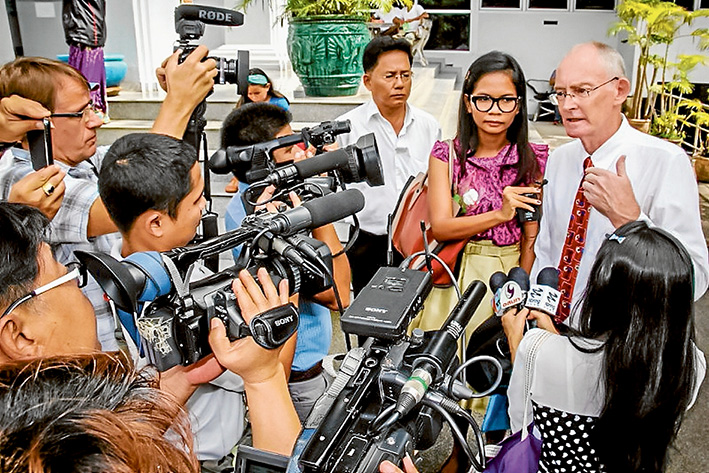
MP News Group journalist David Harrison is in Thailand supporting his mate Alan Morison and his wife Chutima Sidasathian, who were charged in late 2013 with criminal defamation and computer crime over a story they published on their online website Phuketwan about abuses against Rohingya migrants in Thailand.
The charges centred on a paragraph in Phuketwan on 17 July 2013 citing an investigative report by Reuters alleging that some navy officials were involved with trafficking Rohingya Muslims fleeing Myanmar (Burma). The trial generated widespread condemnation from human rights groups and the United Nations.
Morison and Sidasathian faced up to seven years in jail but last week were found not guilty of all charges. The Thai navy has until the end of September to appeal. Harrison has been supporting the two journalists by organising fundraisers, a petition and a rally in Melbourne. He attended the court case in Phuket in July and returned for last week’s judgment. This article has been posted on Phuketwan and has generated worldwide interest.
___________
By DAVID HARRISON
BEGAN my career in journalism about the same time as Alan Morison, half a century ago at the afternoon newspaper, The Herald, in Melbourne, Australia.
It sold more than half a million copies a day. It was a force in the city. It was listened to by politicians, by business people, by judges and lawyers, and was loved and respected by its readers.
Its journalists did not set out consciously each day to seek that approbation of its readers, who comprised about one in five of Melbourne’s population.
They simply, like blind Justice, did their job – to discover and bring to the public the news of the day, whatever that news happened to be.
Nor did we concern ourselves much with what public reaction might be to what we wrote. We knew we had the support of our journalistic seniors and the public. We were part of what was then called the Fourth Estate, a term born in 18th century Britain to describe the huge influence of newspapers in the life of the nation.
Originally the press – the Fourth Estate – ranked with the other three estates.
These were the British parliamentary estates known as the Lords spiritual, the Lords temporal and the members of the House of Commons. That is, the press and its journalists ranked alongside the unelected members of the British House of Lords, both churchmen and the nobility, and the elected members of the Commons. The press had – and wielded – the power to bring down governments, to change government policy, and to rein in government power.
Generally it used this power responsibly.
This was the environment in which young journalists learned their trade. Alan has continued to do this throughout his working life, in the finest traditions of the press.
He now publishes his news in the new medium of the world wide web. He is part of the new fabric of news dissemination.
He and his very impressive colleague Chutima Sidasathian have published news on their Phuketwan website that is certainly not to the taste of everyone who reads it.
News has been defined as ‘’something that someone, somewhere, does not want published. All the rest is advertising”.
Alan and Chutima do not deal in advertising or seek to please their readers. They simply seek out the truth and disseminate it. The consequences in the case of their reporting of people smuggling in Thailand have been very serious indeed. Both face the possibility of jail.
For what? Has anyone challenged the truth of their reporting? No. They have been faithful to the best centuries-old traditions of their calling. They are in the legal position they face because their facts have annoyed people in power in Thailand.
These facts meet the classic definition – they were something that some people did not want printed. They were embarrassing, they were seen to diminish the standing of powerful people in a powerful social institution, the Royal Thai Navy, which was not mentioned in the report against which they took offence.
The facts were not challenged – Alan and Chutima’s resolve to publish them, and therefore to shine a spotlight on a great and deeply troubling social issue, was under challenge. They were to be crushed as an example to others for their bold impertinence.
The original publisher of the words that drew the navy’s response were not sued. They were too big and powerful.
Shame on Reuters for abandoning Phuketwan to its fate.
In the long term such facts must – must – be published. The public has a right to know. All around the world, journalists daily pay for this demand on them with their freedom, sometimes their lives.
Thailand needs more journalists, and more media proprietors, who will take the risk of a backlash from powerful people and institutions in what they present to the community, whatever the risk and consequence.
It is vital to strong democracies for this to be done. It is vital for Thailand’s future that its powerful institutions respect the Fourth Estate and its practitioners for doing their job.
The nation will never develop into a strong democracy without letting the facts – diligently gathered and responsibly reported – from being freely disseminated. It is the test every governing regime faces, and must pass.